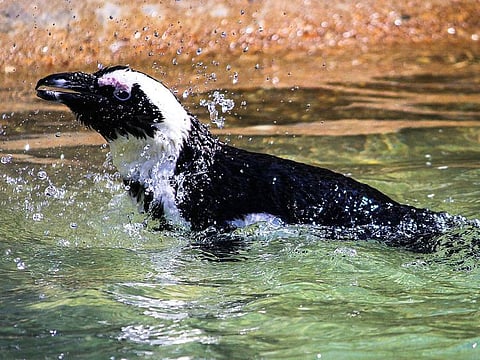Video: Seabirds feast when penguins herd fish to surface
Scientists have long suspected penguins herd fish so they are hunted from above and below

Paris: When pint-size African penguins dive in the icy waters off South Africa’s Stony Point, there’s a good chance that hungry cormorants and shearwaters are hovering overhead.
The birds remain in a holding pattern in the air because the penguins, when they reappear, are likely to have herded a school of anchovies to within striking range.
Let the dive-bombing begin.
The penguins, of course, are not acting out of altruism.
Pushing the swarm of darting fish from depths of greater than 30 metres toward the surface is in their interest too.
It closes off one escape route — up — for the anchovies, and makes it easier for the tuxedoed waterbirds to dive for a meal multiple times within a short period.
Scientists and fisherman have long suspected that penguins herded the hapless fish so that they are simultaneously hunted from above and below.
Similar coordinated attacks on fish schools — sardines, in this case, with Cape gannets feeding from the skies — have been observed with dolphins doing the herding. But there was no proof that penguins did the same.
That evidence is now at hand.
A pair of researchers from the department of zoology at Nelson Mandela University in Summerstrand, South Africa strapped mini-video cameras onto 21 African penguins nesting nearby before the birds set off to forage.
The stunning, bird’s-eye footage leaves no doubt that the penguins — most often working in small groups — corral the fish toward the light, snacking along the way.
Only in Africa
As the Sun — shimmering through the water — comes into view, suddenly Cape cormorants, sooty shearwaters and terns break the surface, plunging several metres to grab a fish.
“Our study confirms that diving birds, such as penguins, can drive prey to the surface where they become more accessible to other seabirds,” lead author Alistair McInnes told AFP.
The researchers also showed that the birds take “an active interest” in the penguins, which are known to track schools of fish near their breeding colonies.
The video cameras, which recorded 31 hours of dives, were easily removed once the penguins returned to their nests to feed fledglings waiting for a regurgitated meal.
Adult African penguins, which can dive deeper than 100 metres, stand about 65 centimetres tall and weigh on average about three kilos.
It is the only penguin species that breeds in Africa, and is found nowhere else.
They are thought to have numbered about 1.5 million at the turn of the 20th century, but today only some 70,000 breeding pairs remain.
The species is threatened with extinction, listed as “endangered” on the International Union for the Conservation of Nature Red List.
African penguins live in colonies, and generally form monogamous relationships.



